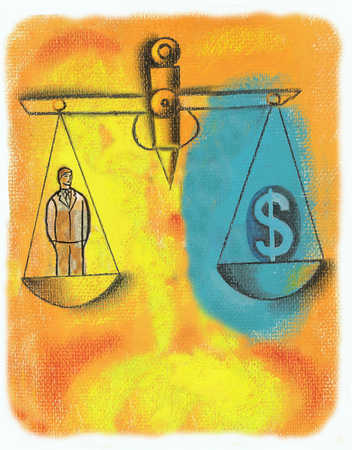
Translation is a service and not a physical product that you can store in the stockroom and have it ready for customers when they request it. This means that from the moment the client requests a translation, a complex process begins. In this process several factors are in play that depend on the specific needs of each client.
For example, if the client needs an urgent translation, the price will be higher than for a normal translation, since a translator, editor, and proofreader who are all available and qualified for the specific field of the project will have to be found quickly.
As a result, we can conclude that if we want a high-quality translation that passes through all of the processes to ensure that the end product is as promised in the sales stage (coherence of terminology, perfect spelling, correct style and localization, etc.) and if we hope it is delivered in record time, and that this all happens at a low cost for the client, we are, unfortunately, dreaming.
A company that hires translation services must take these factors into consideration to be conscious of the reasons why the prices are what they are. Translation is a complex task that requires highly-qualified people, not only qualified in linguistic matters, but also in the specialized field(s) for the particular project.
Given this background, it is important to remember that a combination of two of these fundamental factors should be considered when discussing a translation project, since the possibility of optimizing all three is quite low. The combinations thus are:
– Price and quality: in this case, time is sacrificed in favor of better project management. What is possible here is having one translator handle translation, one editor work on editing, and one proofreader tackle the proofreading. This offers the best possibility for maintaining coherence in terminology, style, etc.
– Price and time: here, quality is sacrificed since more than one translator, and potentially more than one editor, must be used, which greatly complicated the ability to guarantee a high-quality, coherent product.
– Quality and time: this option removes “lowest cost” as the deciding factor and instead focuses on the urgency involved. Translators for the field must be found and, since they will have to work quickly and most likely outside of their accustomed work schedules, the agency is able to charge a higher rate for their services and the total cost of the project.
It is, therefore, extremely complicated to generate a high-quality product at a desirable price in a quick fashion. Companies that are looking to pay for a translation project must understand that and know which of these aspects they are willing to put in the background in order to emphasize the others, guaranteeing that they turn out perfect.
De todo lo anterior se deduce que acceder a un producto de calidad, a un precio asequible y de forma rápida es excesivamente complicado, con lo cual, la empresa que desee contratar servicios de traducción debe ceder en alguna de las premisas para que se pueda hacer hincapié en el resto y al menos se cumplan con total garantía dos de ellas.
(Source: https://www.trustedtranslations.com/precio-calidad-y-rapidez-2010-03-01.html)





